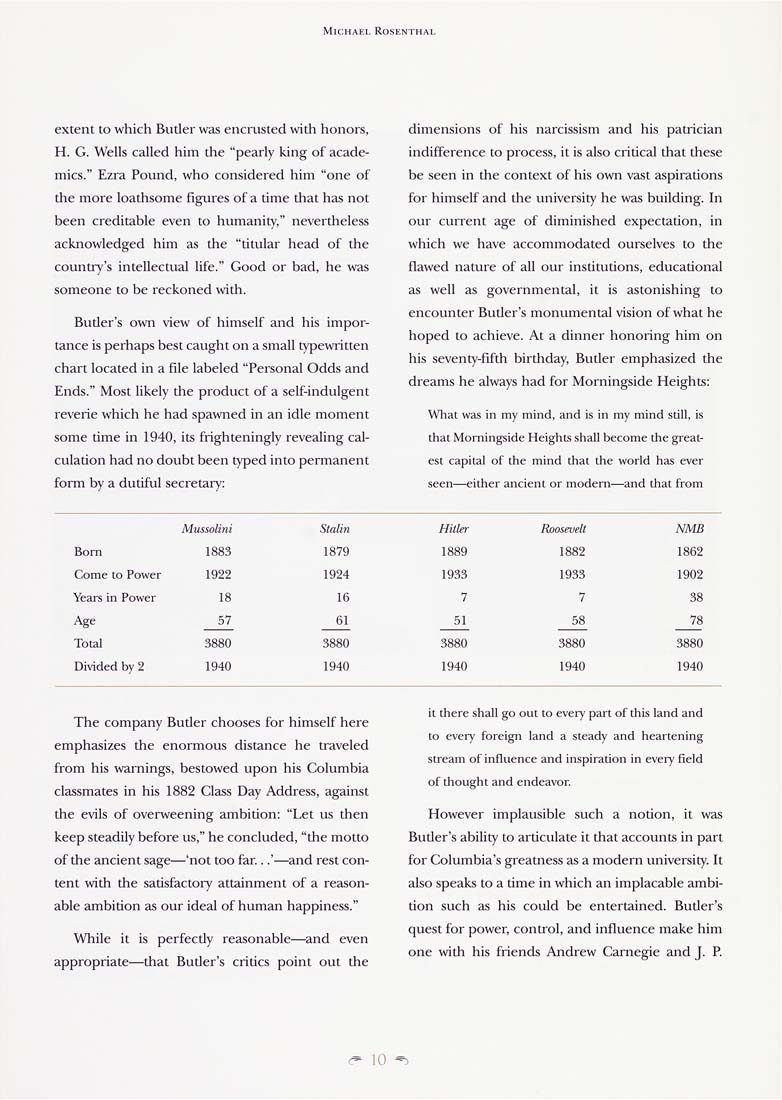Columbia Library columns (v.44(1995))
(New York : Friends of the Columbia Libraries. )
|
||
|
|
|
|
| v.44,no.2(1995:Autumn): Page 10 |

Michael Rosenthal extent to which Butier was encrusted with honors, H. G. Wells called him the "pearly king of acade¬ mics." Ezra Pound, who considered him "one of the more loathsome figures of a time that has not been creditable even to humanity," nevertheless acknowledged him as the "titular head of the country's intellectual life." Good or bad, he was someone to be reckoned with. Buder's own view of himself and his impor¬ tance is perhaps best caught on a small typewritten chart located in a file labeled "Personal Odds and Ends." Most likely the product of a self-indulgent reverie which he had spawned in an idle moment some time in 1940, its frighteningly revealing cal¬ culation had no doubt been typed into permanent form by a dutiful secretary: dimensions of his narcissism and his patrician indifference to process, it is also critical that these be seen in the context of his own vast aspirations for himself and the university he was building. In our current age of diminished expectation, in which we have accommodated ourselves to the flawed nature of all our institutions, educational as well as governmental, it is astonishing to encounter Buder's monumental vision of what he hoped to achieve. At a dinner honoring him on his seventy-fifth birthday, Butier emphasized the dreams he always had for Morningside Heights: What was in my mind, and is in my mind still, is that Morningside Heights shall become the great¬ est capital of the mind that the world has ever seen—either ancient or modern—and that from Mussolini Stalin Hitler Roosevelt NMB Born 1883 1879 1889 1882 1862 Come to Power 1922 1924 1933 1933 1902 Years in Power 18 16 7 7 38 Age 57 61 61 68 78 Total 3880 3880 3880 3880 3880 Divided by 2 1940 1940 1940 1940 1940 The company Buder chooses for himself here emphasizes the enormous distance he traveled from his warnings, bestowed upon his Columbia classmates in his 1882 Class Day Address, against the evils of overweening ambition: "Let us then keep steadily before us," he concluded, "the motto of the ancient sage—'not too far...'—and rest con¬ tent with the satisfactory attainment of a reason¬ able ambition as our ideal of human happiness." While it is perfectiy reasonable—and even appropriate—that Butier's critics point out the it there shall go out to every part of this land and to every foreign land a steady and heartening stream of influence and inspiration in every field of thought and endeavor. However implausible such a notion, it was Buder's abihty to articulate it that accounts in part for Columbia's greatness as a modern university. It also speaks to a time in which an implacable ambi¬ tion such as his could be entertained. Buder's quest for power, control, and influence make him one vrith his friends Andrew Carnegie and J. P. 10 ^ |
| v.44,no.2(1995:Autumn): Page 10 |







